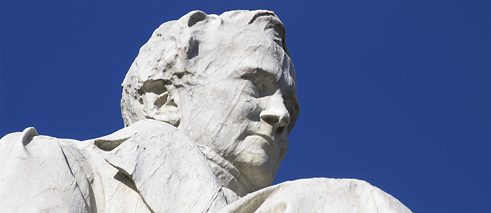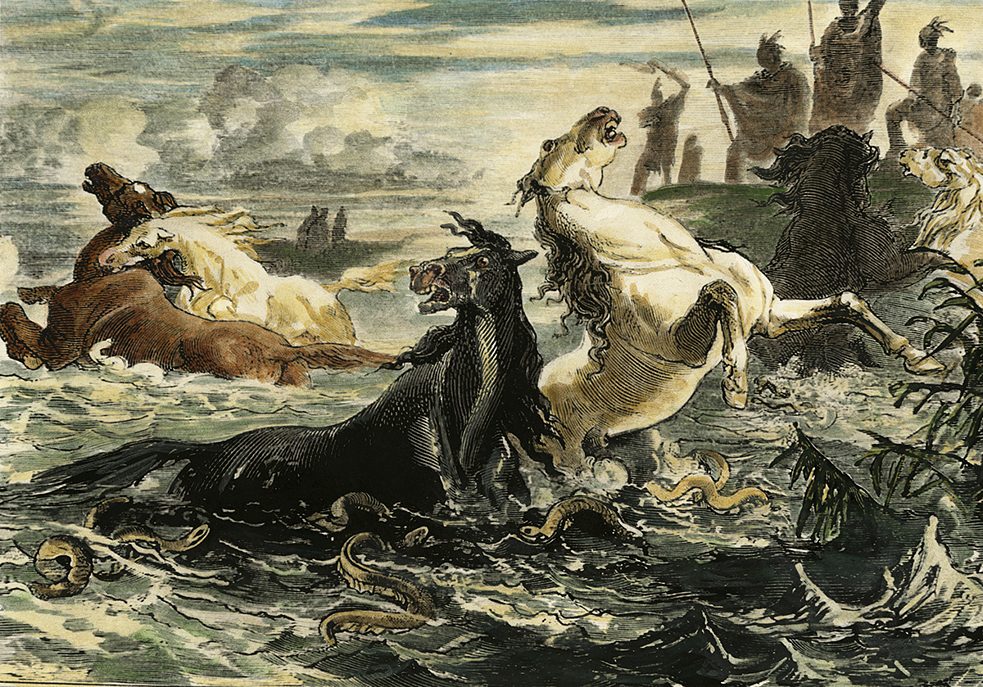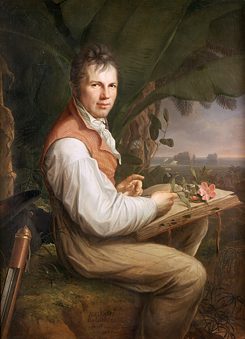250 years of Alexander von Humboldt
Cracks in the memorial

Alexander von Humboldt has many enthusiastic supporters, but also some critics. On the science superstar’s 250th birthday, experts warn that his greatness as a person has been exaggerated, though no one disputes his accomplishments as a researcher.
From the rooftops, visitors to Ciudad Bolivar in the heart of Venezuela can admire the delta of the Orinoco River and the jungle in the background. During the rainy season, the humidity is almost 100 percent and the temperature only dips slightly below 30 degrees, even at night. It is easy to imagine the trials and tribulations Alexander von Humboldt undertook on in February 1800 when he set off to explore across the Orinoco from Caracas to the Rio Negro. It was the Berlin scientist's first expedition, celebrated by many as the scientific discovery of South America, and marked the beginning of a career that would lead to worldwide fame.
This sincere enthusiasm about a man who was probably the first superstar in the enlightened history of science and one of the last universal scholars continues unabated to this day. His teachings on reciprocal interactions in nature, travel diaries and thirst for adventure have made him a legend. Universities and schools, and even one lunar mare, have all been named in his honour. On 14 September 2019, a grand total of 250 candles would have graced his birthday cake. Since blowing all of them out would probably have taken quite a while, the foundation that bears his name declared 2019 the year of Humboldt. Numerous events throughout the year will address the work of the renowned Prussian officer’s son.
 Electric eels leap at horses in the Orinoco. With this experiment, von Humboldt proved that eels also attack land animals. Wood engraving from 1870.
| Photo: © picture alliance/akg-images
In her bestselling book, The Invention of Nature: Alexander von Humboldt’s New World, and the second volume, The Adventures of Alexander von Humboldt, Andrea Wulf details the researcher’s ground-breaking insights. She claims, for example, that Humboldt predicted “climate change caused by humans as early as 1800.” In his opening address for the anniversary year in Ecuador, German Federal President Frank-Walter Steinmeier said: “He was one of the greatest explainers of nature the world has ever known.”
Electric eels leap at horses in the Orinoco. With this experiment, von Humboldt proved that eels also attack land animals. Wood engraving from 1870.
| Photo: © picture alliance/akg-images
In her bestselling book, The Invention of Nature: Alexander von Humboldt’s New World, and the second volume, The Adventures of Alexander von Humboldt, Andrea Wulf details the researcher’s ground-breaking insights. She claims, for example, that Humboldt predicted “climate change caused by humans as early as 1800.” In his opening address for the anniversary year in Ecuador, German Federal President Frank-Walter Steinmeier said: “He was one of the greatest explainers of nature the world has ever known.”
“Humboldt is vastly overrated”
Some scientists feel that Humboldt’s reputation has been overinflated. “With all due respect – Humboldt is vastly overrated,” Matthias Glaubrecht, head of the Centre for Natural History at the University of Hamburg, says. While author Wulf sees him as having “invented nature” and predicted man-made climate change, zoologist Glaubrecht contends, “Humboldt had a completely different idea of the world. He rejected the idea of development.” There is a good reason, he adds, that Humboldt’s understanding of nature was replaced by Darwin’s theory of evolution in 1859 at the latest, the year of his death. Even the insight from Humboldt’s expedition through Venezuela that deforestation affects the climate cannot truly be understood as a warning of looming climate change, Glaubrecht contends.
Colonialism’s henchman?
 Portrait of scientist Alexander von Humboldt by Friedrich Georg Weitsch, 1806
| Photo: © Wikipedia, gemeinfrei
Humboldt’s attitude towards slavery and colonialism is also controversial. The "No Humboldt21" initiative, for example, opposes the planned opening of the Humboldt Forum in Berlin, in part because they object to the name. Germany’s largest new museum in the rebuilt Berlin Palace is scheduled to open at the end of 2019 and will bring together all the capital’s non-European collections. One of the initiative’s resolutions states that the exploration of certain regions of the world by European researchers significantly contributed to these regions’ exploitation: “Accordingly, Prussia’s ‘real discoverer of America’, who went so far as to unearth the dead and ship them to Europe, embodies colonial dominance.” Furthermore, the activists assert, the Spanish Crown backed Humboldt’s research expeditions. In return for comprehensive travel permits, Humboldt supposedly held back his political criticism. The Spanish Crown also benefited from the information he provided about the areas he visited, activists assert.
Portrait of scientist Alexander von Humboldt by Friedrich Georg Weitsch, 1806
| Photo: © Wikipedia, gemeinfrei
Humboldt’s attitude towards slavery and colonialism is also controversial. The "No Humboldt21" initiative, for example, opposes the planned opening of the Humboldt Forum in Berlin, in part because they object to the name. Germany’s largest new museum in the rebuilt Berlin Palace is scheduled to open at the end of 2019 and will bring together all the capital’s non-European collections. One of the initiative’s resolutions states that the exploration of certain regions of the world by European researchers significantly contributed to these regions’ exploitation: “Accordingly, Prussia’s ‘real discoverer of America’, who went so far as to unearth the dead and ship them to Europe, embodies colonial dominance.” Furthermore, the activists assert, the Spanish Crown backed Humboldt’s research expeditions. In return for comprehensive travel permits, Humboldt supposedly held back his political criticism. The Spanish Crown also benefited from the information he provided about the areas he visited, activists assert.
Humboldt expert Andrea Wulf strongly disagrees. She argues that Humboldt rejected the idea of colonialism and slavery and supported the revolution in Venezuela: “He talked about the ‘barbarism of civilised man’ when he saw how the local people were treated by colonists and missionaries.” Humboldt also criticized the unjust distribution of land, monocultures, violence and working conditions in the colonies, she adds.
Munich historian Frank Holl also vehemently rejects the Berlin initiative’s accusations, pointing to the great man’s writing as proof of his personal convictions. According to Holl, Humboldt noted that there could be no lasting happiness in America until the “race belittled but not debased by long oppression shares all the advantages resulting from the progress of civilization and the perfection of social order”. This, Holl argues, is “quite clearly an anti-colonialist and republican attitude” expressed in a manner that is “by no means cautious or reserved”.
Despite these qualifications from his supporters, the superstar of science’s monument has revealed a few cracks at the event of his 250th birthday. This has not, however, changed Alexander von Humboldt’s importance for and impact on natural research.